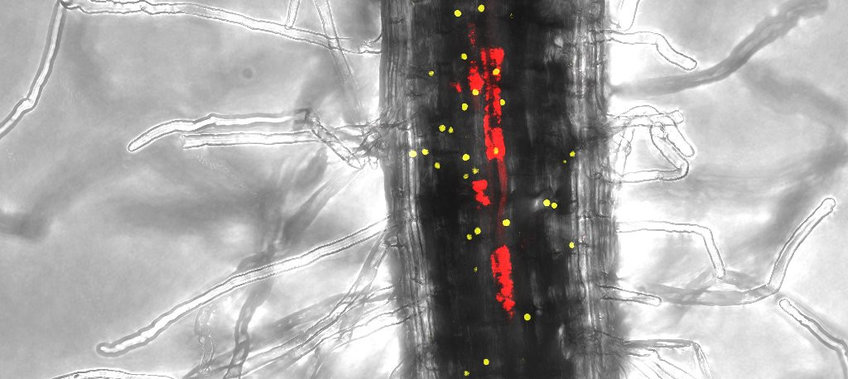
Mycorrhiza and Root Biology
To improve nutrient uptake, most land plants form symbioses with root-colonizing arbuscular mycorrhizal fungi. The main focus of the research in the group "Mycorrhiza and Root Biology" led by Prof. Dr. Caroline Gutjahr is to understand the molecular mechanisms underlying the formation of an arbuscular mycorrhiza.
In the field, plants face a limited availability of vital mineral nutrients. To increase nutrient uptake most land plants form symbioses with root colonizing arbuscular mycorrhiza fungi that efficiently take up mineral nutrients from the soil and transport them into the root. In return, they receive up to 20 % of the plants photosynthetically fixed carbon.
Root colonization by arbuscular mycorrhiza fungi involves distinct and genetically separable developmental steps that are largely under plant control. These steps include dramatic plant cell rearrangements that precede differentiation of fungal hyphae into particular shapes inside these plant cells. We are interested in the plant molecular mechanisms required for shaping an arbuscular mycorrhiza. Our major research line investigates molecular interconnections between plant and symbiosis development, including the role of plant hormone signaling pathways. We use state of the art genetic, molecular, cell biological and biochemical methods and address the following overarching questions:
- Which molecular mechanisms underly accommodation of arbuscular mycorrhiza fungi inside plant roots?
- How does the plant adjust arbuscular mycorrhiza development with its developmental and physiological state under dynamically changing environmental conditions?
- Which mechanisms regulate nutrient exchange between the symbionts?
- Are there overlaps and similarities between accommodation of symbiotic and of pathogenic filamentous microbes?
- Which is the genetic basis for positive performance responses to arbuscular mycorrhiza?
More details will follow soon.
Our Projects
Transcriptional regulation of arbuscule accommodation inside plant cells
Arbuscules are highly branched hyphal structures of arbuscular mycorrhiza fungi, which form inside root cortex cells. Arbuscules and the root cortex cells they colonize represent the major site for symbiotic nutrient exchange. Arbuscule formation, requires signal exchange and subcellular remodeling of the host cell and is accompanied by cell-autonomous transcriptional changes. We investigate transcription factor complexes and networks regulating transcriptional changes required for arbuscule development. More information here.
Nutrient and metabolite exchange at the plant-fungal interface
Arbuscular mycorrhiza fungi provide mineral nutrients to the plant and receive photosynthetically-fixed carbon in return. This exchange of nutrients and metabolites mainly occurs between arbuscules and arbuscule containing cells. In addition, it is conceivable that the organisms exchange signalling molecules inside root cells. We investigate which nutrients and metabolites are exchanged, what is the mechanism of exchange and how the exchange is regulated. For example, in the past we found that plants provide lipids to AM fungi (Keymer et al., 2017) and not only hexoses as previously assumed. More information here.


